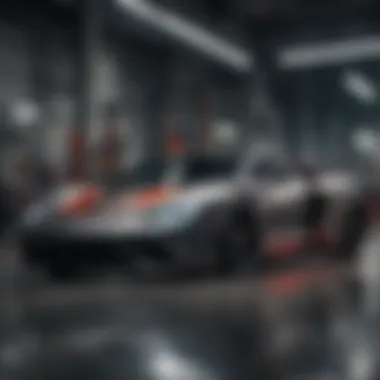Unveiling the Transformation of Automobil Manufacturing: Innovations, Trends, and Key Players


Automotive Latest News
The automotive industry is a dynamic landscape, constantly evolving with new car launches, industry updates, and technological advancements. Each development sends ripples through the sector, shaping the future of automobil manufacturing. Stay tuned as we delve into the latest trends and innovations that are propelling automotive production forward. Discover how these advancements are redefining the very essence of driving, integrating cutting-edge technologies and sustainable practices to create a more efficient and eco-friendly industry.
Car Reviews
In the world of automobil manufacturing, expert reviews, user ratings, and comparisons with competitors play a crucial role in shaping consumer decisions. Experts meticulously analyze every aspect of a vehicle, from performance to design, providing invaluable insights for potential buyers. User ratings offer real-world feedback, giving a glimpse into the ownership experience. Comparisons with competitors highlight the strengths and weaknesses of each model, aiding buyers in making informed choices. Join us as we dissect the latest car reviews, providing in-depth analyses to guide you through the sea of options available in the market.
How-To Guides
Navigating through the intricacies of automobil maintenance, DIY repair, and performance upgrades can be a daunting task for many car enthusiasts. Our how-to guides serve as comprehensive manuals, offering step-by-step instructions and tips to keep your vehicle in top condition. Whether you're looking to perform simple maintenance tasks yourself or seeking to enhance your car's performance, our detailed guides cover a wide array of topics. Explore the world of automobil DIY with us as we empower you to take control of your vehicle's upkeep and enhancements.
Automotive Events Coverage
Auto shows, car races, and industry conferences provide a platform for industry players to showcase their latest innovations and interact with enthusiasts. These events serve as hubs for networking, knowledge sharing, and unveiling groundbreaking technologies. From sleek concept cars at auto shows to thrilling races on the track, automotive events offer a glimpse into the future of driving. Join us as we provide exclusive coverage of these events, capturing the essence of innovation and passion that drive the automotive industry forward.
Featured Articles
Delving behind the scenes at car manufacturers unveils the untold stories of dedication and innovation that shape the industry's future. Discover the inner workings of renowned automakers, from design studios to production facilities, witnessing firsthand the meticulous process of creating iconic vehicles. Future trends and innovations in automobil manufacturing offer a glimpse into what lies ahead for the industry, from electric vehicles to autonomous driving technologies. Join us on a journey through the latest advancements and upcoming trends that are revolutionizing the automotive landscape.
Introduction
The automotive industry has long been a cornerstone of modern society, driving technological advancements and shaping economic landscapes across the globe. Understanding the complexities of automobil manufacturing is essential in grasping the intricate web of processes that bring vehicles from conceptualization to actualization. This section serves as a gateway to the multifaceted world of automotive production, shedding light on the fundamental aspects that underpin this dynamic sector.
Understanding Automobil Manufacturing
Historical Perspective
One of the pivotal elements in comprehending automobil manufacturing is delving into its historical roots. Exploring how automotive production evolved over time provides valuable insights into the industry's trajectory. From the early days of manual assembly to the advent of automated manufacturing processes, each phase has contributed distinctively to the sector's evolution. Understanding the nuances of historical perspectives allows us to appreciate the challenges faced and innovations spurred during different eras.
Current Landscape
Navigating the current landscape of automobil manufacturing is crucial for staying abreast of contemporary practices and trends. With industry 4.0 technologies redefining production methodologies, it is imperative to analyze the prevailing strategies adopted by manufacturers. From lean manufacturing principles to just-in-time production systems, each aspect of the current landscape plays a significant role in shaping the industry's dynamics. By closely inspecting the current state of automobil manufacturing, one can discern the opportunities and challenges that lie ahead.
Key Components
At the heart of automobil manufacturing lie its key components, the building blocks that culminate in the creation of vehicles. From engines and chassis to intricate electronic systems, understanding the significance of each component is paramount in fostering a holistic view of automotive production. By examining the intricacies of these components, we gain a comprehensive understanding of the engineering marvels that drive the automotive industry forward.
Importance of Automobil Manufacturing
Economic Impact


The economic impact of automobil manufacturing reverberates far beyond the assembly lines, influencing global trade and domestic economies. By dissecting the economic ramifications of automotive production, we can identify the ripple effects that stem from this extensive industry. From employment generation to supply chain dynamics, each facet of the economic impact carries implications that touch diverse sectors of the economy.
Technological Advancements
Technological advancements are the lifeblood of automobil manufacturing, propelling the industry towards greater efficiency and innovation. Embracing cutting-edge technologies such as robotics and artificial intelligence revolutionizes production processes, setting new benchmarks for quality and precision. By elucidating the transformative power of technological advancements, we uncover the boundless potential that awaits the automotive sector.
Employment Opportunities
As automobil manufacturing evolves, so do the employment opportunities it presents. Exploring the diverse roles available within the industry sheds light on the skill sets in demand and the career paths open to aspiring professionals. From design engineers to supply chain managers, the spectrum of employment opportunities in automobil manufacturing showcases the industry's multifaceted nature.
Scope of the Article
Key Focus Areas
The key focus areas of this article illuminate the pivotal topics that define the landscape of automobil manufacturing. By honing in on crucial aspects such as sustainability and technological advancements, we uncover the driving forces behind industry innovation. Analyzing these key focus areas provides a comprehensive overview of the diverse elements that collectively shape the future of automobil manufacturing.
Industry Insights
Delving into industry insights offers a glimpse into the trends and developments that steer the automotive sector. By scrutinizing market dynamics, consumer preferences, and competitive landscapes, we gain valuable perspectives on the industry's trajectory. Unveiling these industry insights empowers us to make informed decisions and anticipate future trends in automobil manufacturing.
Technological Advancements
In the realm of automobil manufacturing, technological advancements play a pivotal role in shaping the industry's landscape. The continuous evolution of technology has led to increased efficiency, precision, and innovation within the manufacturing process. By embracing technological advancements, automakers can streamline production, reduce costs, and enhance overall product quality. Moreover, these advancements serve as the driving force behind the industry's progress towards sustainability and future growth. From automation to data analytics, technological advancements in automobil manufacturing signify a paradigm shift towards a more efficient and environmentally-conscious future.
Automation in Manufacturing
Robotics Integration
Robotic integration in automobil manufacturing has revolutionized assembly lines, significantly improving production speed and accuracy. The precise maneuvers and repetitive tasks handled by robots not only boost operational efficiency but also ensure consistency in output quality. One distinctive characteristic of robotics integration is its ability to adapt to diverse manufacturing requirements seamlessly. These adaptable robotic systems offer a cost-effective solution for carrying out intricate processes with minimal downtime, enhancing the overall manufacturing workflow. While the benefits of robotics integration are diversified ranging from increased productivity to improved workplace safety, some challenges like initial setup costs and maintenance complexities need to be considered.
AI Application
The integration of Artificial Intelligence (AI) applications in automobil manufacturing introduces intelligence and autonomous decision-making capabilities into the production process. AI algorithms analyze vast datasets to optimize production schedules, predict potential equipment failures, and identify areas for performance enhancement. A key characteristic of AI application is its ability to learn from patterns and continuously improve processes, leading to enhanced operational efficiency and resource utilization. The unique feature of AI application lies in its adaptive nature, where it can self-optimize based on real-time feedback, thus driving continuous improvement. Although advantageous in enhancing predictive maintenance and optimizing production processes, AI application may face challenges related to data privacy and the need for skilled workforce for implementation.
Industry Innovations
In the era of Industry 4.0, innovations such as IoT integration and big data analytics have redefined automobil manufacturing processes. The Internet of Things (IoT) integration enables interconnected systems, machines, and devices to communicate and share data in real-time, optimizing overall operational efficiency. A key characteristic of IoT integration is its ability to create a networked ecosystem where data flows seamlessly, leading to enhanced decision-making and predictive maintenance. The unique feature of IoT integration is its scalability and adaptability, allowing automakers to customize solutions as per their specific requirements. While IoT integration brings benefits like improved asset tracking and real-time monitoring, challenges related to cybersecurity and data management need attention.
Big Data Analytics
Big data analytics in automobil manufacturing empower companies to extract actionable insights from massive datasets, enabling data-driven decision-making and strategic planning. The key characteristic of big data analytics is its capacity to process and analyze complex data sets rapidly, uncovering patterns and trends that would otherwise remain concealed. This analytical approach helps in optimizing production processes, enhancing supply chain management, and improving overall operational efficiency. The unique feature of big data analytics lies in its ability to provide real-time insights, contributing to agile and responsive decision-making. While advantageous in driving operational efficiencies and enhancing customer experiences, challenges related to data security and data quality assurance must be addressed.


Green Technologies
The integration of green technologies in automobil manufacturing is instrumental in reducing the industry's carbon footprint and promoting sustainability. Electric vehicles represent a significant aspect of green technologies, offering clean energy alternatives to traditional fossil fuel-powered vehicles. The key characteristic of electric vehicles lies in their reduced emissions and energy-efficient operations, contributing to environmental preservation. The unique feature of electric vehicles is their potential to revolutionize the transportation sector by minimizing reliance on conventional fuels and mitigating environmental impact. While the advantages of electric vehicles are undeniable in fostering eco-friendly mobility solutions, challenges like infrastructure development and battery disposal pose significant hurdles that need to be overcome.
Sustainable Practices
Embracing sustainable practices in automobil manufacturing entails adopting eco-conscious strategies that prioritize resource efficiency and waste reduction. Through initiatives such as recycling and upcycling, automakers can minimize waste generation and optimize resource utilization. One key characteristic of sustainable practices is their long-term positive impact on the environment and community, aligning with global sustainability goals. The unique feature of sustainable practices lies in their ability to foster a circular economy where waste materials are repurposed, reducing environmental strain. While the benefits of sustainable practices are manifold, challenges related to initial implementation costs and regulatory compliance need meticulous consideration.
Key Players in Automobil Manufacturing
In this section, we delve into the significant role of key players in automobil manufacturing, shedding light on their impact and influence in shaping the industry. As the automotive landscape continues to evolve rapidly, understanding the key players becomes essential. These industry giants not only drive innovation but also set benchmarks for quality and sustainability practices. By examining the strategies and advancements of these key players, we gain valuable insights into the present and future of automobil manufacturing.
Leading Automakers
Tesla
Tesla, a trailblazer in electric vehicle technology, spearheads the transition towards sustainable mobility. The company's relentless focus on electric vehicles (EVs) has revolutionized the automotive market. Tesla's emphasis on performance, range, and design has set a new standard for EVs, reshaping consumer expectations. The visionary leadership of Elon Musk defines Tesla's innovative culture, driving the company to push boundaries and redefine the automotive industry. Despite challenges, Tesla remains a frontrunner in the EV sector, constantly pushing the envelope of what is possible in the realm of sustainable transportation.
Toyota
As a seasoned player in the automotive industry, Toyota embodies reliability, durability, and efficiency. With a diverse portfolio spanning from hybrid vehicles to fuel-efficient models, Toyota caters to a wide range of consumer preferences. The brand's commitment to cutting-edge technology combined with a strong focus on sustainability sets Toyota apart. Toyota's continuous pursuit of excellence and emphasis on quality control have positioned it as a trusted choice for consumers worldwide. Despite facing competition from newer entrants, Toyota's legacy and established reputation solidify its standing in the industry.
Volkswagen
Volkswagen, known for its engineering prowess and iconic vehicle designs, has been a dominant force in the automotive market for decades. The brand's commitment to innovation, coupled with a strategic emphasis on electric mobility, underscores Volkswagen's forward-thinking approach. Volkswagen's unwavering dedication to quality and safety reflects in its diverse product offering, catering to a global audience. With a focus on sustainability and technological advancement, Volkswagen continues to evolve and adapt to meet changing market demands. Despite facing challenges, Volkswagen's resilience and adaptability position it as a key player in the automobil manufacturing landscape.
Emerging Companies
NIO
NIO, a rising star in the electric vehicle segment, embodies innovation and luxury. The company's electric SUVs have garnered attention for their cutting-edge features and performance capabilities. NIO's holistic approach to EVs, encompassing battery swapping technology and AI integration, sets it apart in the market. With a strong emphasis on user experience and sustainability, NIO aims to redefine the traditional automotive paradigm. Despite being a relatively young player, NIO's disruptive strategies have propelled it into the spotlight as a formidable competitor in the EV space.
Rivian
Rivian, with its focus on adventure and sustainability, is reshaping the landscape of electric adventure vehicles. The company's trucks and SUVs combine rugged aesthetics with eco-conscious engineering, appealing to outdoor enthusiasts and environmentally conscious consumers. Rivian's innovative approach to electric mobility, including off-road capabilities and high-performance attributes, positions it as a frontrunner in the EV adventure segment. With a commitment to sustainability and premium craftsmanship, Rivian demonstrates a unique blend of innovation and environmental responsibility.
Lucid Motors
Lucid Motors, known for its luxury electric sedans, embodies elegance and cutting-edge technology. The company's dedication to performance and range has marked it as a formidable contender in the luxury EV market. Lucid's attention to detail, from design intricacies to advanced battery technology, showcases a commitment to excellence. By prioritizing aerodynamics and range efficiency, Lucid Motors delivers an unmatched driving experience for discerning consumers. Despite being a newcomer, Lucid Motors' focus on luxury and sustainability sets a new standard for premium electric vehicles, positioning it as a key player in the evolving automotive landscape.
Sustainability in Automobil Manufacturing


Sustainability in automobil manufacturing has emerged as a pivotal area of focus within the automotive industry, driving shifts towards greener and more responsible practices. This section aims to delve into the various components and considerations that make sustainability a key priority in this sector. With the global spotlight on environmental concerns intensifying, automakers are under increasing pressure to adopt eco-friendly strategies that not only reduce their carbon footprint but also enhance their reputation as socially responsible entities. By incorporating sustainable practices into their manufacturing processes, companies can not only mitigate their impact on the environment but also generate long-term cost savings through efficient resource management.
Circular Economy Practices
Circular economy practices, specifically recycling initiatives, play an indispensable role in promoting sustainability within automobil manufacturing. Recycling initiatives involve the reprocessing of materials from end-of-life vehicles to create new products, thus reducing waste and conserving valuable resources. The key characteristic of recycling initiatives lies in their ability to close the loop on material use, enabling a more efficient and environmentally friendly approach to production. This method stands out as a popular choice in automobil manufacturing due to its alignment with the industry's shifting focus towards sustainability. While recycling initiatives offer significant environmental benefits, challenges such as the proper segregation of materials and the need for advanced recycling technologies must be addressed to maximize their effectiveness. Upcycling strategies represent another innovative approach towards sustainable manufacturing practices in the automotive industry. Upcycling involves repurposing materials or components from old vehicles for new applications, thereby adding value and reducing waste. The unique feature of upcycling lies in its ability to transform discarded resources into high-quality inputs, contributing to a more circular and resource-efficient production cycle. Despite its potential advantages in terms of cost savings and environmental impact, upcycling strategies may face challenges related to scalability and quality control, requiring careful planning and implementation to realize their full potential.
Output Format
Incorporating carbon neutrality goals is imperative for automakers striving to reduce their environmental impact and address climate change concerns. Encompassing initiatives such as achieving net-zero emissions, companies can set ambitious targets to minimize their carbon footprint. The key characteristic of pursuing net-zero emissions is the commitment to offsetting carbon emissions through renewable energy sources or carbon credits, effectively balancing the carbon released with an equivalent amount sequestered or offset. Net-zero emissions represent a beneficial choice for this article as they showcase the industry's dedication to environmental stewardship while catalyzing the transition towards a more sustainable future. Renewable energy sources offer a robust foundation for achieving carbon neutrality within automobil manufacturing. By harnessing solar, wind, or hydroelectric power, companies can significantly reduce their reliance on fossil fuels and lower their greenhouse gas emissions. The key characteristic of renewable energy sources lies in their capacity to provide clean and sustainable power for manufacturing operations, aligning with the industry's sustainability objectives. While renewable energy sources present numerous advantages in terms of environmental performance and long-term cost savings, challenges such as intermittency and initial investment costs must be carefully addressed to ensure their seamless integration into automobil manufacturing processes.
Future Trends in Automobil Manufacturing
Future Trends in Automobil Manufacturing play a pivotal role in shaping the trajectory of the automotive industry. As technological advancements continue to revolutionize the way vehicles are designed and manufactured, staying ahead of trends is crucial for industry players. Embracing innovative materials and manufacturing processes is essential to meet the evolving demands of consumers for efficient, sustainable, and customizable vehicles. This section delves into two key elements driving the future of automobil manufacturing: Innovative Materials and Personalization and Customization. ### vative Materials ### ### bon
Carbon Fibe
ds as a revolutionary material in automotive manufacturing due to its exceptional strength-to-weight ratio. Its lightweight properties make vehicles more fuel-efficient while ensuring enhanced durability. The versatility of Carbon Fiber allows for intricate designs that were previously unattainable with traditional materials, providing automakers with the creative freedom to push boundaries. However, its high production costs remain a challenge for widespread adoption. #### Biodegradable Po
Biodegradable Polymer
the other hand, offer a sustainable solution to reduce environmental impact. These polymers break down naturally, contributing to a cleaner manufacturing process and end-of-life vehicle disposal. The eco-friendly nature of Biodegradable Polymers aligns with the industry's push towards sustainability and circular economy practices. While Biodegradable Polymers show promise in mitigating ecological concerns, their durability and performance compared to traditional materials warrant further research and development. ### Personalization and Customi n ### #### 3D Printing #### 3D Printi tro a new dimension omobil manufacturing by enabling the rapid production of intricate components. This technology allows for on-demand customization, facilitating the creation of unique vehicle parts tailored to consumer preferences. 3D Printing reduces waste, optimizes production workflows, and accelerates prototyping processes, presenting significant cost and time-saving benefits. However, limitations such as material strength and scalability hinder its widespread application in mass production. #### Smart Manufacturing #### Smart Manufacturing rates cutting-edge techn s like IoT and data analytics to streamline production processes and enhance operational efficiency. By harnessing real-time data insights, manufacturers can identify bottlenecks, optimize inventory management, and automate quality control measures. Smart Manufacturing enables agile and responsive production systems, minimizing downtime and maximizing output. Despite its transformative potential, the high initial investment and cybersecurity risks associated with interconnected systems necessitate robust implementation strategies. This section highlights how the marriage of innovation and customization holds the key to unlocking a new era in automobil manufacturing, where sustainability, efficiency, and consumer-centric design converge to drive industry evolution.
Challenges and Opportunities
In the realm of automobil manufacturing, the section on Challenges and Opportunities assumes a pivotal role, acting as a critical driver for industry evolution and adaptation. This segment delves deep into the intricate web of obstacles and prospects that shape the automotive landscape. Embracing a multidimensional approach, it navigates through the complexities of supply chain disruptions, shedding light on their far-reaching implications. By unraveling the core challenges faced within the sector, this section aims to provide invaluable insights for stakeholders to fortify their strategic frameworks and capitalize on emerging opportunities. Furthermore, the discourse extends beyond mere identification of issues, delving into actionable strategies and innovative approaches to overcome hurdles and harness the potential offered by the ever-evolving automobil industry.
Supply Chain Disruptions
Global Pandemics Impact
Within the constellation of supply chain disruptions, the Global Pandemics Impact stands as a formidable force reshaping the dynamics of automobil manufacturing. This aspect disrupts traditional paradigms, underscoring the vulnerabilities of global supply chains to external shocks. The swift onset and widespread ramifications of pandemics have foregrounded the necessity for resilience and adaptive capacity within the industry. The notable characteristic of Global Pandemics Impact lies in its ability to catalyze paradigm shifts, compelling firms to reassess their operational frameworks and crisis response mechanisms. Despite its disruptive nature, Global Pandemics Impact affords the industry an opportunity for introspection and recalibration, fostering a culture of preparedness and agility in the face of unprecedented challenges.
Logistical Challenges
Complementing the narrative of supply chain disruptions, Logistical Challenges emerge as a complementary facet influencing the operational efficiency and strategic endeavors of automobil manufacturers. These challenges manifest in diverse forms, spanning logistical bottlenecks, transportation inefficiencies, and inventory management complexities. The inherent complexity of Logistical Challenges underscores the critical importance of streamlined processes and optimized logistical frameworks to sustain competitive advantage and meet evolving consumer demands. Infused with the essence of precision and foresight, addressing Logistical Challenges necessitates a holistic approach that integrates innovation, technology, and strategic foresight to surmount barriers and foster operational excellence within the automobil industry.
Shift Towards Electric Vehicles
The paradigm shift towards Electric Vehicles represents a seminal transformation within the automotive domain, heralding a new era of sustainability and technological advancement. At the core of this transition lie two pivotal aspects - Infrastructure Development and Government Policies - each playing a distinctive role in sculpting the future trajectory of automobil manufacturing.
Infrastructure Development
Drawing focus on Infrastructure Development unveils a realm brimming with opportunities and challenges, encapsulating the need for robust charging networks, sustainable energy sources, and infrastructure scalability to support the burgeoning fleet of Electric Vehicles. This critical aspect not only underscores the importance of efficient infrastructure deployment but also emphasizes the imperative of fostering collaboration between public and private entities to realize a cohesive and comprehensive infrastructure landscape conducive to widespread EV adoption. As a key driver of sustainable mobility, Infrastructure Development stands poised at the forefront of catalyzing transformative change and ushering in a new era of automotive innovation.
Government Policies
In parallel, Government Policies emerge as a catalytic force shaping the contours of electric mobility and regulatory frameworks governing automobil manufacturing. By enacting policies that prioritize emissions reduction, incentivize electric vehicle adoption, and advance research and development in clean energy technologies, governments worldwide play a pivotal role in steering the industry towards sustainable growth and environmental stewardship. The distinct feature of Government Policies lies in their ability to establish a regulatory roadmap that aligns industry practices with overarching environmental objectives, fostering a conducive environment for innovation and sustainable business practices. Despite inherent challenges and potential drawbacks, Government Policies act as a cornerstone for driving systemic change and fostering resilience within the automobil sector.



